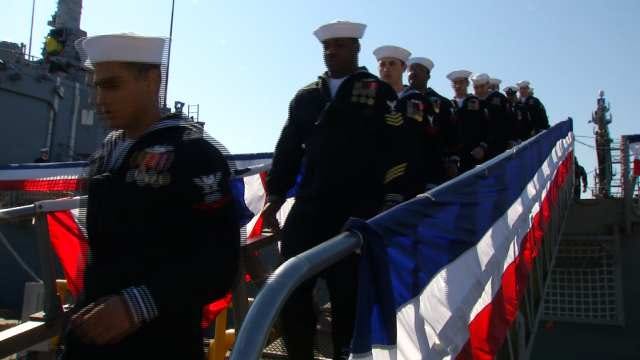Family Says Farewell To Decommissioned Warship Named After Oklahoman
<p>The ship was named in honor of a farm boy from Checotah, who, given the choice, would have hoped for another ending.</p>Thursday, May 2nd 2013, 11:04 pm
In the United States Navy, it was Fast Frigate 52--The USS Paul Carr.
I have a special feeling for the Carr, and the Oklahoma family who watched over it. Nineteen years ago, I was aboard the ship for a week in the Red Sea.
When I heard the Carr was being decommissioned, I wanted to see it off; to remind us, again, we don't have to look far for heroes.
The ship, like so many others before it, is passing into another stage of history.
Play the director's cut of Scott Thompson's story by clicking on the video player above.
It's a history whose first page was written by a farm boy from Checotah, who, given the choice, would have hoped for another ending. But war didn't allow Paul Henry Carr to choose; it handed him a death sentence.
And forty years after fate carried it out, the world's mightiest Navy gave its newest warship his name.
"A United States warship being named for my uncle, that was just an amazing thing," said Mike Rush.
On March 13, 2013, the frigate Paul Carr left the fleet after 27 years of service to the nation.
It was the only ship in the Navy named for an Oklahoman, the only ship in the Navy with an extended family in the middle of the country. They watched over it from afar and sailed along, riding every wave with the deepest pride for the name it carried and the sailors who served aboard, from the first day it slipped into the ocean, to this last, stripped and shuttered, tied-up at a Navy yard pier.
In 1994, I spent a week aboard the Carr, and its sister ship, the destroyer John Hancock, as the two sailed in the Red Sea, enforcing a United Nations weapons embargo against Saddam Hussein's Iraq. The ships were charged with stopping and searching freighters, 24 hours a day, for six months, working to keep weapons from being smuggled to an outlaw regime.
During my time aboard, I met sailors from Oklahoma and saw the touches that tied the ship to this state, including replicas of Paul Carr's medals and a painting of the last moments of his life.
They reinforced Carr's legacy in a story that was passed from the ship's first commander and crew to its last.
"And that story really inspired the sailors on board, it was something to look to, see what he did and see what we could strive for," said USS Carr's last commander, Commander Patrick Kulakowski.
It was the last major sea battle of the Second World War--off Samar, Leyte Gulf, the Philippines. A flotilla of tiny U.S. warships up against Japanese battleships and cruisers. One of the greatest mismatches in naval history.
Aboard the battered Samuel B. Roberts, gun captain Paul Carr was loading shells by hand, without power or compressed air. Of 325 shells at their disposal, Carr and his crew got off 324. The last exploded in the overheated gun turret and tore Paul Carr open from neck to thigh.
He was 20 years old that day he died.
In 1994, before traveling to the Red Sea, I sat down with seven of Paul Carr's eight sisters. They shared their stories of a red-headed baby brother, who loved football and horses and playing guitar, and of the young man who joined the Navy to do his part.
His part ended with a Silver Star, and in 1983, with his surviving shipmates petitioning the Navy to name a frigate in his honor.
Of the sisters I met that day, four have passed away and three can no longer travel. That left the baby, Juanita, to be at her brother's ship farewell, surrounded by her sons and Paul Carr's other nieces and nephews and their families. It was an Oklahoma flotilla of prideful hearts, there to see their ship pass into history.
Paul Carr's remains sank with the Roberts. There was never a funeral back in Checotah.
In a way, 69 years later, the sailors filing off for the final time serve as Paul Carr's pall-bearers--a last link to his ship, no longer alive.
"I just felt inside, sort of, what I call 'teary,'" said Juanita Carr Rush.
There was one last moment for the family on the flight deck--a final photo, a final wash of memories.
Paul Carr's mother - Mama Carr, they called her - always held to the hope that her son would find his way back home, that the Navy's telegram had been a terrible mistake.
"And so I can remember, growing up, she would keep the screen door unlocked, just in case brother would come home," said PauCarrce, Nancy Milam.
Knowing 52 was still out at sea, made it easier all these years, made it seem a brave young Oklahoman was still on watch, until this final climb down the gangplank.
"There's an emptiness there, because I know I won't ever be able to do that again," Juanita said.
With those slow, hesitant steps, Paul Carr's memory now belongs to another place, to that place where a frightened farm boy finds incredible courage, to the place where Mama Carr can finally latch that screen door.
Friday at 10 p.m. on News On 6, I'll show you how the Carr's role changed over the years, and how Paul Carr's family is working in Checotah to make sure his story, and that of his namesake ship, is remembered.
More Like This
September 29th, 2024
September 17th, 2024
Top Headlines
December 14th, 2024
December 14th, 2024
December 14th, 2024
December 14th, 2024













